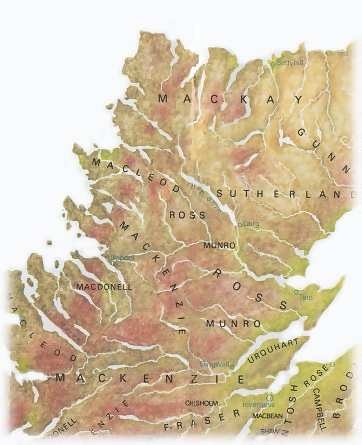Although the name Ross is not exclusively of Highland origin, its use in America is overwhelmingly Scottish. The first United States census, conducted in 1790, identified 3,172,444 whites. An exhaustive study of these early Americans determined 17 names to be "distinctively Scotch." Among these 17 names were Bruce, Duncan, Munro, and Ross. This study further established that Scots by birth or descent constituted about one-twelfth of the population and that the name Ross was used by one "Scotchman" of about every thousand. As will be explained later, however, Rosses 'immigrated' to America at a rate which far exceeded their proportion. Variations of the name, such as Rosse, Roose, Rowse, Russ, Rouse, and Rossi were found by the study to be of origins other than Scotland. Ross was also determined to be a relatively common German name, but of far less distribution than bearers who were of Scottish descent. "Practically no Irish usage was recorded."

Scottish (not Scotch, which is an alcoholic beverage) use of the surname Ross is taken from the Gaelic term which means "promontory." The particular promontory from which the name is derived is the arm of land that extends eastward toward the North Sea above Inverness, an area which now serves as headquarters for the ocean-bottom oil drilling industry in the North Sea. Observed on a map, the 'promontory' seems almost indistinct, but due to the inland reaches of the Moray Firth to the south and the Dornoch Firth to the north, this area is surrounded on three sides by water -- and is thus a 'promontory,' at least from a fourteenth and fifteenth century point of view. The Royal Burgh of Tain, actually a very pleasant and hospitable town, is located on this stretch of land and is still considered headquarters of Clan Ross. Near Tain, also, is the "Ross Castle" of Balnagowan, which was owned at the time of the author's visit in 1975 by an Arab businessman who forbids visitors.
It is frequently presumed that Ross-shire (now the county of Ross and Cromarty) took its name from the abundance of Rosses who lived there; but, in fact, the reverse is true. Before surnames came into general use, but subsequent to the need to identify oneself by more than a single name, Highlanders identified themselves in the style of "John of Glengarry" or "William of Rarichies." More distinguished individuals were "of" a larger place, such as "David of Ross." This gradually became "David, first of Ross," "David, eighth of Ross," etc., and then more specific: "David Ross of Pitcalnie," and so on. Those who used the style "of Ross" (rather than "of" a smaller place) were generally the aristocracy and often were leaders of the Clan or its derived branches.
Like all other Highland clans, the Rosses have several "septs" and "dependents" (affiliations). The full list, as commonly recognized, is as follows: Anderson, Andrew, Dingwall, Gillanders, MacAndrew, MacCulloch, MacLulich, MacTaggart, MacTear, MacTier, MacTire, Taggart, Vass, and Wass.
In an Act of Parliament passed in 1587, the names of all the Highland Clans are specified, including Clan Ross. By that year the Rosses were among the most numerous of the family names in Ross-shire. In evaluating this statistic, however, one must remember that this tabulation included all families who claimed allegiance to the clan -- irrespective of their surname. Particularly, this included the septs and dependents enumerated above. Although rather modern in terms of time, the following excerpt from an 1815 statistical account of Ross-shire is another description of how early Rosses acquired their surname:
"Most of the landowners, and in truth most of the people, bore the name of Ross, or to speak more correctly, almost everybody possessed two surnames, by one of which (in general a patronymic beginning with Mac) he was universally known in conversation, though he deemed himself called upon to change it to Ross, or sometimes to Munro, whenever he acquired any status in society, or became able to write his name. When the by-names of those who had risen in society had been forgotten, it became absolutely necessary to invent others to distinguish the multitudes of Rosses and Munros."
Thus, even after residents of Ross-shire adopted the surname Ross, their very numbers demanded an additional means of more specific identification. The Scottish surname prefix "Mac," meaning "son of" did not presume or demand descendency, but rather was used in the Clan sense. Rosses, deviating from this style, used place names - since Ross, itself, was a place name: John Ross of Balblair; William Ross of Glenfield; and so on.
Members of sept and dependent families who can show an ancient connection with Ross-shire are considered members of Clan Ross, and are entitled to wear the Ross plaid and the Ross Crest. (Note, however, that a Crest is only one element of a Coat of Arms, and is not part of the Arms proper.)